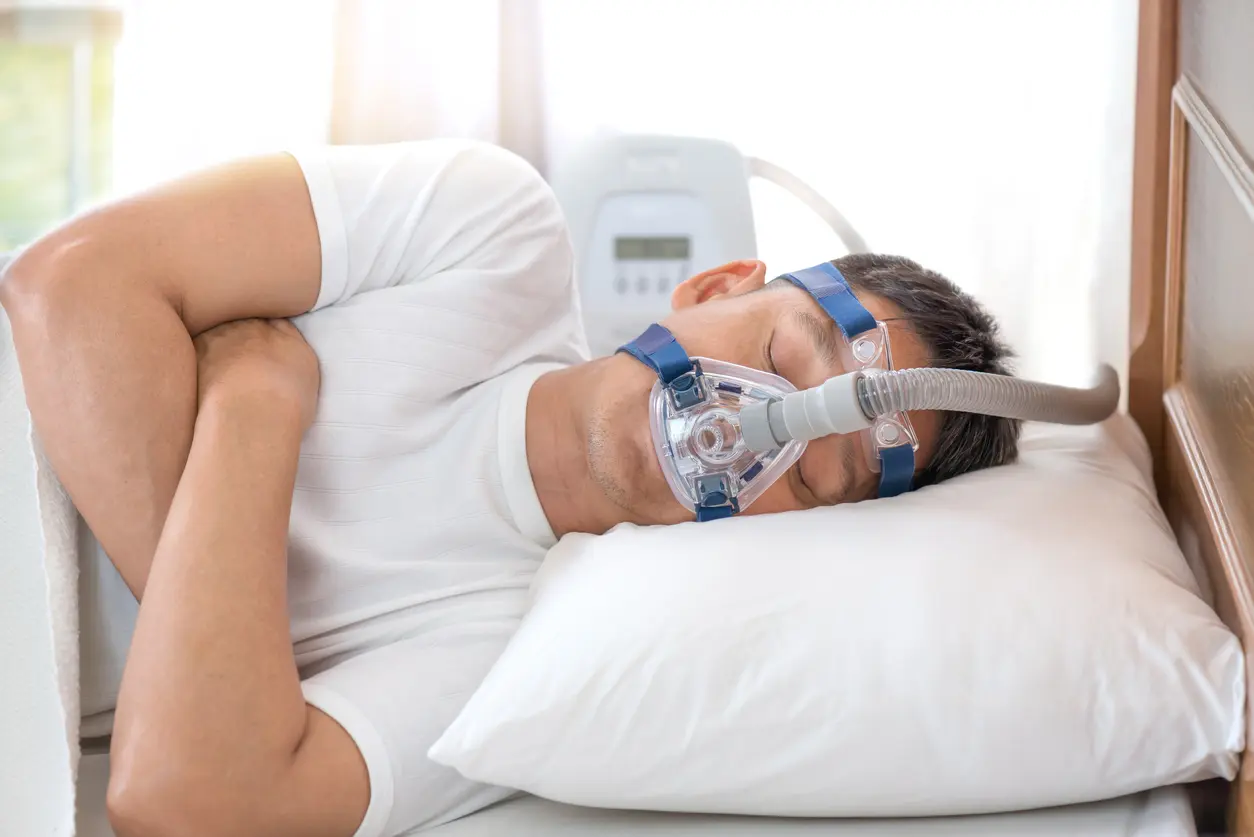How CPAP Therapy May Lower Mortality in Sleep Apnea-Related Heart Disease
- Globally, 936 million people suffer from mild to severe obstructive sleep apnea.
- People with obstructive sleep apnea are more likely to suffer from cardiovascular disease and other diseases.
- CPAP machines may reduce the risk of dying from cardiovascular disease for people with obstructive sleep apnea.
- A new study suggests that CPAPs may be more effective than weight loss drugs for reducing plaque buildup in arteries around the heart in obstructive sleep apnea patients.
It is estimated that around 936 million people worldwide suffer from mild to severe obstructive sleep apnea. This condition is where a physical obstruction, such as the tongue, causes breathing difficulty or pauses while asleep.
Studies have revealed that individuals with obstructive sleep apnea may be more vulnerable to developing other illnesses, such as cardiovascular disease.
According to a study, individuals with obstructive sleep apnea can potentially lower their likelihood of dying due to a cardiovascular issue by utilizing a continuous positive airway pressure (CPAP) device while sleeping.
Another research indicates that a CPAP machine might be more effective than a medication used to reduce weight in lessening the accumulation of plaque in the coronary arteries of individuals with obstructive sleep apnea.
Understanding Obstructive Sleep Apnea (OSA)
During sleep apnea, a person's breathing can temporarily stop or become shallow and irregular, disrupting their sleep.
Sleep apnea can be classified into three types:
- A common type of sleep apnea is obstructive sleep apnea
- When the brain stops signaling the respiratory muscles to breathe, central sleep apnea occurs
- During treatment for obstructive sleep apnea, complex sleep apnea can develop.
The following symptoms characterize sleep apnea:
- Mood changes
- Insomnia and restless sleep
- Tiredness
- Breathing that stops for a few seconds when asleep
- Headaches
- Gasping for air while sleeping
- Loud snoring
To help reduce sleep apnea, a person may be fitted with a CPAP (Continuous Positive Airway Pressure) machine. This device is worn while sleeping and provides a constant air stream through a mask placed over the nose and mouth. This helps keep the breathing passages open, allowing the individual to breathe more easily and preventing pauses in breathing.
Medicines, surgery, and lifestyle modifications such as proper sleep habits, weight management, and healthy eating can all be used to treat sleep apnea.
How Sleep Apnea Increases Heart Disease Risk
Previous research has indicated that individuals with sleep apnea can be more susceptible to cardiovascular illnesses, such as atrial fibrillation, stroke, heart attack, coronary artery disease, hypertension, and congestive heart failure.
An individual with obstructive sleep apnea can experience short pauses in breathing, ranging from five to thirty times in a single hour, depending on the condition's intensity.
When breathing pauses during sleep, the oxygen levels in the body decrease, producing adrenaline. When adrenaline levels are high, blood pressure rises.
Over time, if the body is constantly under stress while sleeping, the frequent fluctuations in blood pressure can damage the blood vessels, leading to clogged arteries and heart problems.
Studies have indicated that the use of a CPAP machine for obstructive sleep apnea can lead to a decrease in the risk of cardiovascular disease and events. A study found that patients with obstructive sleep apnea who used a CPAP machine had a lower risk of fatal and nonfatal cardiovascular events than those who did not.
In addition, another study revealed that older adults with obstructive sleep apnea who used a CPAP machine had a lower risk of cardiovascular disease events.
The Link Between CPAP Use and Heart Disease Mortality
A study was conducted to see how CPAP treatment affects the incidence of cardiovascular events in people with obstructive sleep apnea who are living in the real world.
The scientific evidence for the relationship is strong, and lab and observational studies have suggested that using CPAP treatment to manage obstructive sleep apnea could help prevent cardiovascular complications.
CPAP treatment is effective in several areas relating to cardiovascular disease, such as blood pressure, echocardiographic parameters, left ventricular function, and venous thromboembolism. However, the results of randomized control trials, considered the highest quality studies available to clinical researchers, have not found any benefit of CPAP on cardiovascular events. These conflicting results have been the subject of much research in the obstructive sleep apnea field, prompting us to conduct our nationwide analysis.
To compare the effects of CPAP therapy, researchers looked at data from over 3,600 people with obstructive sleep apnea. Half of these people no longer used CPAP therapy, while the other half continued to use their CPAP machines.
The study conducted by the scientists revealed that those who maintained their CPAP therapy had a significantly lower risk of death from any cause, cardiovascular disease, and hospitalisation due to cardiovascular disease when compared to those who did not use the therapy. The risk reduction was estimated at 40%, 36%, and 18%, respectively.
Effects of CPAP Therapy on Sleep Apnea and Heart Health
| Effect | How CPAP Helps | Evidence | Health Outcome |
|---|---|---|---|
| Improved oxygen levels | Prevents airway collapse during sleep | Strong clinical data | Reduces strain on heart and lungs |
| Lower blood pressure | Reduces adrenaline and stress hormones | Moderate to strong | Lowers hypertension risk |
| Better heart rhythm | Stabilises breathing and oxygen levels | Observational studies | Reduces arrhythmia risk |
| Less arterial plaque | May lower inflammation in arteries | Early research | Improves coronary health |
| Reduced mortality | Linked to lower cardiac death rates | Real-world analysis | Improves long-term survival |
How CPAP Therapy May Reduce Arterial Plaque Buildup
For the second experiment, researchers analyzed the impact of CPAP therapy on coronary artery plaque volumeTrusted Source in individuals with obstructive sleep apnea.
For this trial, scientists studied the CT coronary angiogramTrusted Source scans of 30 people who suffer from obstructive sleep apnea to identify any signs of constriction in the blood vessels that supply blood to the heart.
The study participants were randomly divided into two groups, one receiving Continuous Positive Airway Pressure (CPAP) machines and the other receiving injections of the weight loss drug liraglutide (Victoza) for 24 weeks.
After analyzing the data, the investigators observed that those administered CPAP therapy experienced decreased arterial plaque. Furthermore, those who had a combination of CPAP therapy and weight loss drug injections showed reduced aortic inflammation.
Participants in the study who only took the weight loss drug did not experience the same results as those who combined the drug with lifestyle modifications.
People with obstructive sleep apnea are at a greater risk of developing plaque in their arteries than those without the condition. Their blood oxygen levels fluctuate significantly at night, and their sleep is often fragmented. This, in turn, leads to increased inflammation, which can increase the chances of developing coronary artery disease.
This may not be the case despite prior research concluding that CPAP could have been more effective in reducing cardiovascular risk. If CPAP was used earlier in the disease, there may be a beneficial effect. Our preliminary results must be verified in further studies with larger sample sizes.
Why More Research Is Needed on CPAP and Heart Health
It has long been established that there is a link between sleep apnea and various risk factors associated with heart disease. The underlying mechanisms of the connection vary from one risk factor to the next, but when taken together, they can significantly increase a person's chances of developing heart disease.
It would be beneficial to conduct similar studies in other locations besides Spain to further this research. Doing so would allow us to determine if the same results would be observed elsewhere.
This is an intriguing topic that warrants further investigation. We want to conduct more extensive studies to determine if this outcome is genuine.
Connect with one of our doctors at Mobi Doctor with the click of a button and receive the care you require.






